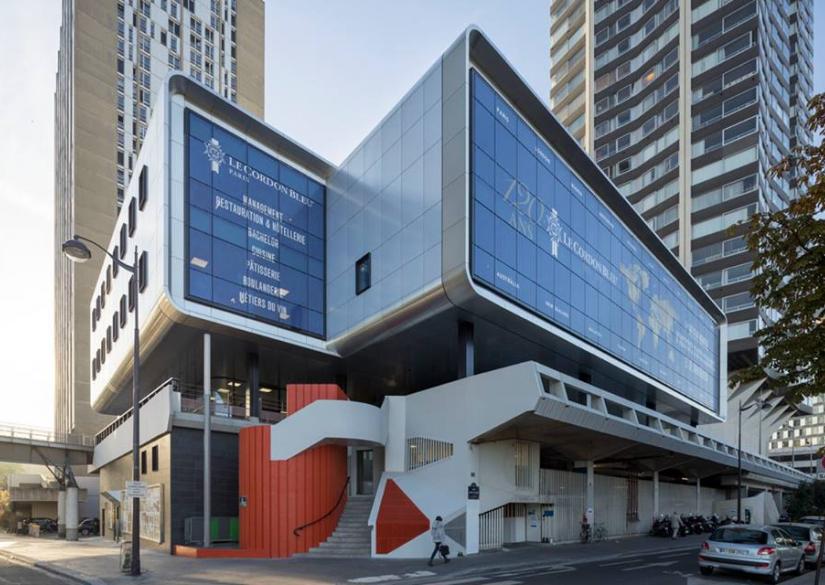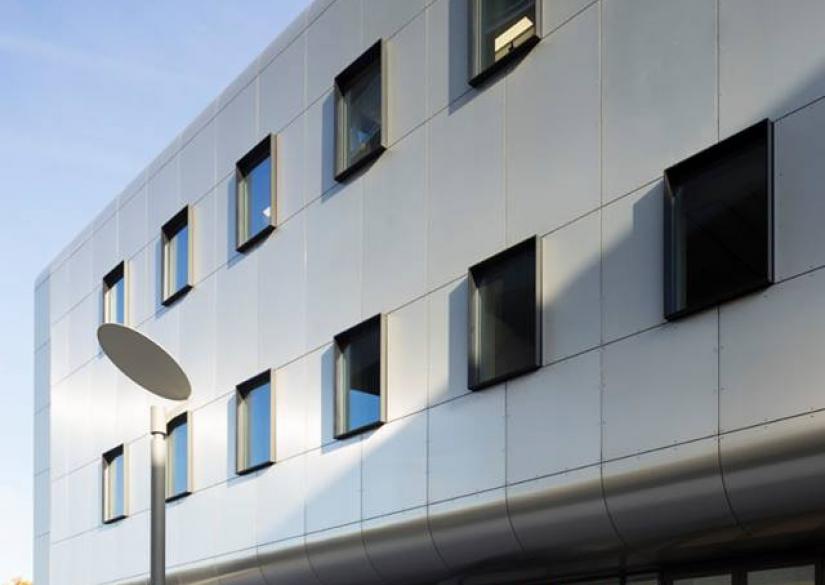Le Cordon Bleu Culinary School
Description of Le Cordon Bleu Culinary School
Perhaps the most famous and glorified culinary school in the world - Le Cordon Bleu - was founded in Paris 120 years ago, in 1895. For more than a century of successful work the Le Cordon Bleu symbol - the blue ribbon with its seal on it - has become a symbol of cooking as an art: the school has earned an impeccable reputation and has become the alma mater of the best chefs around the world. Training here is almost a guarantee of a successful future and employment: restaurants around the world are trying to get specialists trained in Le Cordon Bleu.
The founder of the school was the well-known journalist and culinary critic Martha Distel: she also simultaneously started publishing the magazine Cuisiniere Cordon Bleu, which published news about the restaurant industry, reviews of the best institutions and selected recipes.
Today, Le Cordon Bleu is More than 50 educational institutions in 23 countries, 5 continents and more than 20 thousand students, every day comprehending the most complex culinary art under the guidance of the best specialists with vast practical experience. Let's note the most famous and large branches of the network:
- Paris
Of course, the most important, large, illustrious and legendary school. Paris and France in general are considered to be one of the leading centers of world cuisine and gastronomy - here tasty food is built almost to the rank of religion, which gives Le Cordon Bleu students ample opportunities for experimentation and constant application of knowledge in real practice.
- London
The English capital, representing one of the most cosmopolitan, bright and non-standard cities in the world, opens up to the students of London's Le Cordon Bleu an unlimited space of imagination, creative experiments, With the cuisine of any peoples of the world. In London, one of the most international student trains - here are representatives of more than 50 peoples and cultures, which creates a fertile ground for the exchange of experience and cooperation in different projects. In addition, on the territory of London and the nearest metropolitan area there are more than 40 restaurants-owners of Michelin stars: perhaps, in some of them young graduates will build their future career?
- Madrid
Spanish cuisine is based on numerous recipes for home cooking: honest, hearty, proven centuries and thousands of Spanish families who have kept these recipes from generation to generation. At the same time, modern Spanish gastronomy is very loyal to a variety of experiments and innovative findings (for example, molecular cuisine), which makes it an interesting object for study. Another significant advantage of the Le Cordon Bleu school in Madrid is the opportunity to work with the freshest products, including vegetables and fish, shellfish: the proximity of the sea and fertile lands provide young cooks with everything they need.
- Istanbul
The amazing location of Istanbul on the border of Europe with Asia opens up excellent opportunities for students of Le Cordon Bleu for numerous experiments, non-standard combinations. In particular, the East is famous for its variety of unique spices and flavors - there is no better place to study the diversity of this world of smells and flavors! Oriental sweets, coffee and other traditional drinks, as well as a large number of fresh seafood, available to the students of the Istanbul school almost all the year, deserve special attention.
- Bangkok
Le Cordon Bleu's branch in Bankok has been operating since 2007 - the cooperation was helped by Le Cordon Bleu International and Dusit International (the latter is one of the largest Thai hotel brands) . The school is conveniently located (downtown, lively and prestigious area of Silom): an abundance of expensive hotels and restaurants nearby (including the Dusit Thani Hotel) offers ample opportunities for internships and internships.
- Kuala Lumpur
The capital of Malaysia is an incredibly international city, bright, absolutely unique and distinctive: it affects the national cuisine, which is an amazing mix of traditions from all over Peace. It's not the first year that Kuala Lumpur has been called the culinary capital of Asia - training at the local branch of Le Cordon Bleu will provide an opportunity to test this claim.
- Sydney
The school in Sydney was opened in 1996 - its primary task was to prepare for the 2000 Olympics: but after the end of the sports festival, Le Cordon Bleu continued to work successfully . Here you can get a qualification for the Australian or French model, which gives an additional advantage in international employment.
- Melbourne
A very interactive, vibrant and vibrant Australian city is famous for its restaurants and cooking traditions throughout the Green Continent. In total there are more than 26 thousand students in the city, and 48% of the inhabitants of Melbourne are residents born abroad. The local students of Le Cordon Bleu have significant advantages - a very rich cultural program of interesting events and a low cost of both teaching and living.
- Adelaide
The capital of South Australia is the unofficial student capital of the country, which is becoming more popular every year among foreign students. In the branch of Le Cordon Bleu in Adelaide, strong programs not only for classical cooking, but also confectionery, hospitality, business and restaurant management.
- Wellington
New Zealand is very attractive for both studying and living: beautiful ecology, low prices, the highest standard of living and safety. The country has a rich gastronomic history: it produces the best samples of beef and lamb, salmon and seafood, there are many endemic and rare varieties of fruits and vegetables that students of Le Cordon Bleu can use in their culinary experiments.
- Ottawa
There is only one school of Le Cordon Bleu in Canada, and it is in the bright and cosmopolitan Ottawa. Representatives of more than 70 nationalities and cultures live here permanently: an ideal ground for international cooperation, exchange of experience and cult national traditions.
There are several main specialties in Le Cordon Bleu:
- Culinary arts;
- Confectionery;
- Baking;
- The restaurant business and Management;
- Wine-making.
Having studied at Le Cordon Bleu, international student can receive the following stages of professional education:
- Diploma and the highest diploma;
- Certificate (cooks and confectioners of 3 levels - from primary to higher);
- Diploma of sommeliers.
Also, a variety of seminars and refresher courses, thematic short-term programs, useful for specialists of any level, are constantly held.
The training almost entirely consists of practical classes: students are constantly in kitchens, demonstration rooms, and sometimes on farms or markets, learning to choose the best ingredients for future masterpieces. The famous chefs, owners of Michelin stars, famous culinary historians and critics are engaged with the students, and the best of their students can get an internship in one of the Michelin restaurants.
In due time Le Cordon Bleu was finished by famous chefs and world famous culinary experts and adepts of gastronomy:
- James Peterson;
- Julia Child;
- Bruce and Eric Bromberg;
- Nancy Silverton;
- Nathalie Dupree.

What are the most popular majors among students currently?
Business remains popular, but engineering and IT are quickly gaining ground. STEM fields are seen as advantageous not only for education but also for gaining professional experience, especially with the post-study work opportunities they offer. The pandemic has also sparked increased interest in biological and chemical sciences.
Programs and prices, tuition fees in Le Cordon Bleu Culinary School
Brief information: International student can finish the diploma course in the direction of "Cooking" or "Confectionery art", also offered the opportunity to obtain a higher diploma in these specialties. To obtain a higher diploma, the student must complete the basic diploma course.
Duration of training is usually not more than a year. Students can apply for the program in September, November, January, March and June.
List of specialities:
1) Culinary arts
Training is offered at the primary, secondary and higher levels. In the process of teaching students are waiting for the following topics and directions:
- The Basics of the French Culinary School;
- Definition of French culinary terms;
- Preparation and commencement of work, safety;
- Basic trimming techniques;
- Classical French cutting technique;
- Bouillons, sauces, minced meat and dough;
- Classical ways of preparation of dishes;
- In-depth study of the cuisine of French regions;
- Origin of products and features of regional cuisine;
- Perfection of culinary skills;
- More complex trimming and serving techniques;
- Seasonings, flavor combinations in classical and regional cuisine;
- Color, taste, textures and their combinations;
- Classical and modern "High Kitchen";
- Accuracy and efficiency in the kitchen;
- Development of technologies and techniques; methodology;
- Development of recipes using products of the highest quality; Rare products;
- In-depth study of the classical "High Kitchen";
- Development of the menu; Seasonality of products;
- Development of creative abilities.
2) Confectionery art
Also divided into the initial, middle and upper step. Students learn the following skills:
- The Basics of French Confectionery;
- The main types of test;
- Basic recipes for creams and fillings;
- Traditional cakes and desserts;
- Basic Decorating Techniques;
- Lubrication and glazing;
- Baking (croissants and brioche);
- Main French confectionery terms;
- Decoration of confectionery;
- Types of desserts for restaurants;
- Ptifuras (sweet and savory, eateries);
- Bread Baking Basics;
- Bavarian creams and mousses;
- Caramel and nougat;
- Working with chocolate: handmade and dipping;
- Map of desserts in a modern restaurant: cold and hot;
- Finding the best decorating solutions for desserts. - In-depth study of gustatory nuances, the role of flavors and spices;
- The art of working with chocolate: mousses, dipping, figured chocolate, a mixture of different types of chocolate and textures, sculpture, fake;
- Sugar ornaments: the technique of cooking and painting sugar shapes, sugar products of various shapes. Blown sugar spheres.
3) Higher Diploma
To obtain a higher diploma, international student must complete the basic diploma course. The program includes a more in-depth, more attentive and thorough study of all the main aspects of the work of a cook or confectioner (specialty can be chosen at will).
The requirements for admission to the diploma courses are standard - this age is 18 years and older and the certificate / certificate of completed secondary (school) education.
Quick overview:
The program for obtaining a certificate of a cook or confectioner is also offered on three levels: primary, secondary and higher. The course lasts approximately 1-1.5 months - you can start training in September, October, March, June or August: specific dates you can check with your manager.
Available specialties:
1. Culinary arts - entry level:
- The Basics of the French Culinary School;
- Definition of French culinary terms;
- Preparation and commencement of work, safety;
- Basic trimming techniques;
- Classical French cutting technique;
- Bouillons, sauces, minced meat and dough;
- Classic ways of cooking.
2. Culinary Arts - Intermediate Level:
- In-depth study of the cuisine of French regions;
- Origin of products and features of regional cuisine;
- Perfection of culinary skills;
- More complex methods of cutting and serving;
- Condiments; Flavor combinations in classic regional cuisine;
- Color, taste, textures and their combinations.
3. Culinary art - the highest level:
- Classical and modern "High Kitchen";
- Accuracy and efficiency in the kitchen;
- Development of techniques and techniques; methodology;
- Develop recipes using the highest quality products;
- In-depth study of the classical "High Kitchen";
- Menu development, seasonality of products;
- Development of creative abilities.
4. Confectionery - entry level:
- The Basics of French Confectionery;
- The main types of test;
- Basic recipes for creams and fillings;
- Traditional cakes and desserts;
- Basic Decorating Techniques;
- Baking (croissants and brioche);
- Basic French confectionery terms.
5. Confectionery - medium level:
- Decoration of confectionery;
- Types of desserts for restaurants;
- Ptifuras (sweet and savory);
- Bread Baking Basics;
- Bavarian creams and mousses;
- Caramel and nougat;
- Work with chocolate: handmade and dipping.
6. Confectionery - the highest level:
- Map of desserts in a modern restaurant: cold and hot;
- Secrets of decorating and serving desserts. In-depth study of gustatory nuances, the role of flavors and spices;
- The art of working with chocolate: mousses, dipping, figured chocolate, a mixture of different types of chocolate and textures, sculpture, models. Sugar ornaments: the technique of cooking and painting sugar shapes, sugar products of various shapes.
Quick overview of BACHELOR program:
Bachelor programs at Le Cordon Bleu take 3 academic years. We offer specialty Buisness in culinary arts and Buisness in international hospitality management, the beginning of classes - in September.
Also the structure of the bachelor's courses includes The program Restaurant Management:
- The program lasts 1 academic year;
- An opportunity to get a full diploma;
- six months of theoretical studies;
- Half a year to the internship.
Subjects and sports
Admission dates and extra charges
The dates of training (the beginning of the courses), as well as the cost, depend on the chosen program.
Types of the certificate programs:
Culinary business (cook);
Confectionery;
Undergraduate course
One-year course Restaurant Management
Tuition fee already includes:
- Training on the selected course: theoretical + practical lessons, internships;
- Uniforms;
- The company certificate or diploma on successful completion of training.
Some services are paid additionally:
- Accommodation;
- Round trip air tickets;
- Transfer;
- Personal pocket expenses;
- Compulsory medical insurance;
- Visa fees and services, translation and certification, courier delivery of documents;
- Consular fee (paid at the Embassy).
Literature and references
- Le Cordon Bleu — Wiki
- LE CORDON BLEU LIMITED
- LE CORDON BLEU COLLEGE OF CULINARY ARTS-MIAMI — data USA
- 14 andaluces competirán por el Premio Promesas de la alta cocina de Le Cordon Bleu Madrid
- Abertas as inscrições para bolsas de estudo em curso de gastronomia na Le Cordon Bleu Rio
- Álvaro, un extremeño a las puertas de Le Cordon Bleu
Institution on the map
Residence permits, citizenship and other services
- Guardianship services during the studies
- Student supervision
Review about Le Cordon Bleu Culinary School
Recommendations on when to apply
| Language courses, schools and children's language camps | Primary and secondary education - private schools | Preparation programmes for entering universities - higher education | Higher education (after completing accredited programs A-level, IB, High School) - Bachelor, Master, MBA |
| - we recommend to apply 6-9 months before the start of the course (some camps and schools offer discounts for early booking or for lengthy study programs) - there are some very popular and high demand children's camps, where the applications need to be submitted 1 year in advance (in particular Switzerland , Great Britain , USA , Canada , Austria) | - we recommend to apply one year before the start of the training program, - some schools have a specific time frame (September-November - please specify an individual school) - some schools require tests in several stages (UKISET, internal tests of the school: English, mathematics, logics, subjects, interview, some require a personal visit) | - we recommend to apply one year before the start of the program, - for Foundation and Pathway programs, IELTS and TOEFL certificates are usually required, respectively | - recommended submission one year before the start of the program, - the deadline normally closes in January, for TOP HEIs and, as a rule, in March in other universities - for a bachelor, a Foundation or Pathway preparatory program a completed A-level, IB, High School + IELTS / TOEFL are required - for Masters you need a graduated higher education, in some cases you need a pre-Masters program - MBA requires completed higher education, work experience preferably at least 2-3 years, etc. |


































































